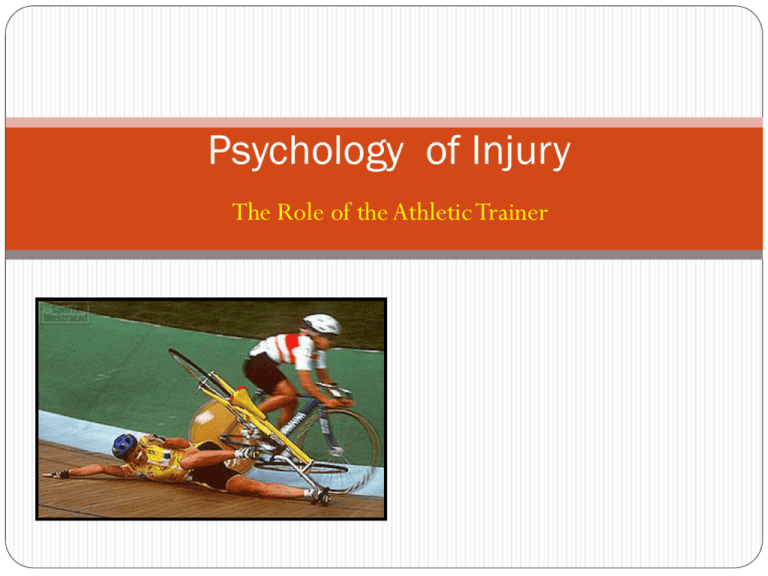Psychology of Injury
advertisement

Psychology of Injury The Role of the Athletic Trainer Today’s objectives… Identify preceding conditions which may predispose to injury Describe how an athlete may respond psychologically to injuries Identify physiological responses to stress 2 3/18/2016 Introduction Devastating nature of injuries Financial concerns Identity Self-esteem 3 3/18/2016 Injury Antecedents Physical Environmental Psychological 4 3/18/2016 Psychological Factors Personality traits Inappropriate attitudes Stress levels Risk takers 5 3/18/2016 Psychological Response Kubler-Ross model 1. Five theoretical stages individuals progress through when confronted with grief 2. Easily adapted to an individual who sustained an injury 6 3/18/2016 7 3/18/2016 Kubler-Ross Model Denial & isolation - Denies seriousness of injury 8 3/18/2016 Kubler-Ross Model Anger - Aware of seriousness of injury - Why me? Why now? - Angry at who? - May become demanding & difficult 9 3/18/2016 Kubler-Ross Model Bargaining - Usually when anger subsides - May be reflected in prayer - May try to negotiate - Promises... 10 3/18/2016 Kubler-Ross Model Depression - Occurs if activity is limited or not allowed - Moody, withdrawn - No point in exercising - Motivation = BIG challenge 11 3/18/2016 Kubler-Ross Model Acceptance - resigned to fact that hard work is necessary to return to safe participation 12 3/18/2016 Other thoughts... Each individual reacts differently Progress at different rates Different order of stages May skip stages May plateau and not progress 13 3/18/2016 Signs of Poor Adaptation Malingering on little issues Guilt may try to rush things Withdrawn from significant others Rapid mood swings Repeatedly coming back too soon & re-injury 14 3/18/2016 Goals to Facilitate Recovery Set realistic expectations Foster social support Develop self-confidence (athlete & txt) Education process 15 3/18/2016 Coming up… Education & credential requirements Athletic trainer Physician Assistant Physical Therapist Paramedic 16 3/18/2016





